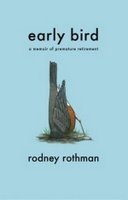[Hint: It's not the blandest fight club ever.]
Okay, so it's Douglas Coupland. Coupland is one of those "experimental" writers who think it's awesome to do stuff like put several pages of nothing but three-letter Scrabble words in their books. And maybe it is awesome; that's not my issue here. But that's the type of writer he is.
Anyway, Mr. Coupland has been running a blog on the New York Times website all summer. The blog is enteratining enough; it features tidbits about book tours, various insights about Canadian and American cultures, and pictures of random crap. It didn't make me want to run out and read all of his books, but it did make me go and pick up Girlfriend in a Coma for the sixth or seventh time--a book that I first read in high school and adored. Being an English major in college subsequently ruined all of my previous favorite books, but Girlfriend fared better than most. It's not all that strong on a literary basis, but the ideas in it that appealed to a cynical eighteen-year-old have only gotten more resonant seven years later.
 The plot is weirdly overcomplicated, but limited to seven people and one town in a concession to simplicity. (One Hundred Years of Solitude this is not.) Canadian teenagers have sex for the first time in 1979; one of them falls into a coma the same night, sending their high school clique into seven different versions of banal adult hell. There's a baby born of the coma chick nine months later, and all sorts of weird circumstances conspire to keep the high school friends from leaving their trapped-in-the-70s neighborhood in Vancouver. There's even an apocalypse involved. Hot stuff.
The plot is weirdly overcomplicated, but limited to seven people and one town in a concession to simplicity. (One Hundred Years of Solitude this is not.) Canadian teenagers have sex for the first time in 1979; one of them falls into a coma the same night, sending their high school clique into seven different versions of banal adult hell. There's a baby born of the coma chick nine months later, and all sorts of weird circumstances conspire to keep the high school friends from leaving their trapped-in-the-70s neighborhood in Vancouver. There's even an apocalypse involved. Hot stuff.Coupland uses it all to back up a comparatively simple thesis: that current life is empty. Drugs! Insularity! Facile psychobabble! Our obsessions with pop culture take a particularly hard hit; Coupland shows us how awful it all is by...stuffing glib pop culture references into every other sentence. So the line between condemnation and postmodern awareness is pretty blurry.
His overall point is still pretty valid. What would any of us do with a collapse of the everyday order? I don't think Coupland's vision of claustrophobic squabbles and self-obsession is all that inaccurate. Still, he chooses to take the interesting premise, and the hyperawareness-as-insight schtick, and cram it all into some easy moralizing. That part gets less palatable as I get older. He's got me sympathizing more with the less-than-fulfilling lives of the characters now; but getting me to feel guilty about my own craptastic existence and then offering nothing but cheap platitudes doesn't really lead us anywhere productive. If the world ends tomorrow, leaving me stuck in Connecticut with my group of friends, I won't know how to fix things properly, and it will be all Douglas Coupland's fault. I hope he's happy.
And now the extract section...or, "why you may want to read the book no matter what snarky things I may have said about it":
"I looked at Karen, with her head resting atop her ski poles. She had the extra pulse of beauty people have when they know they're being fondly admired."
"Wendy's working hard--too hard, it seems. She's not much in love with Linus--obvious to anybody--nor is Linus much in love with Wendy. His soul is full of glue. Karen seems to have understood everyone's life immediately; the others think she is too out of it--too clued out about the modern world--but Karen sees all. She remembers the innocent pointless aims of their youths (Hawaii! Ski bum at Whistler!) and sees that they were never acted upon. But at the same time, larger aims were never defined. Her friends have become who they've become by default. Their dreams are forgotten, or were never formulated to begin with.
Her friends are not particularly happy--not with their lives. Pam had rolled her eyes when Karen asked her if she was happy.
'No.'
'Fulfilled?'
'No.'
'Creative?'
'A little.'
Through the monsters they design and the TV shows they work on, they give vent to the loss they feel inside. Expressions of pettiness, loss, and corruption."
"And then came October 14, 1978, the day Jared snuck up behind Wendy and whispered, See you after the game. Meet me in the parking lot. I've got a bag of candy to give you. And then came the collapse on the football field followed by the thousand passionate nights that never came Wendy's way. And she's never told anybody, because who would believe it? Because she is only Wendy: dutiful, sexless, brainy, and almost a tragedy (in her father's eyes) had Linus not happened along. Romantic beauty is for others."
"In London the supermodels wear Prada and the photographers snap their photos. The young princes read their Guinness Book of World Records. In California, meetings are held and salad is picked at. Across the globe hydro dams generate electricity and radio towers send powerful signals out to the heavens advertising Fiat Pandas and creme rinses. Golden lights oscillate wildly. Giant receiving dishes rotate and scour the universe for voices and miracles. And why shouldn't they?"


